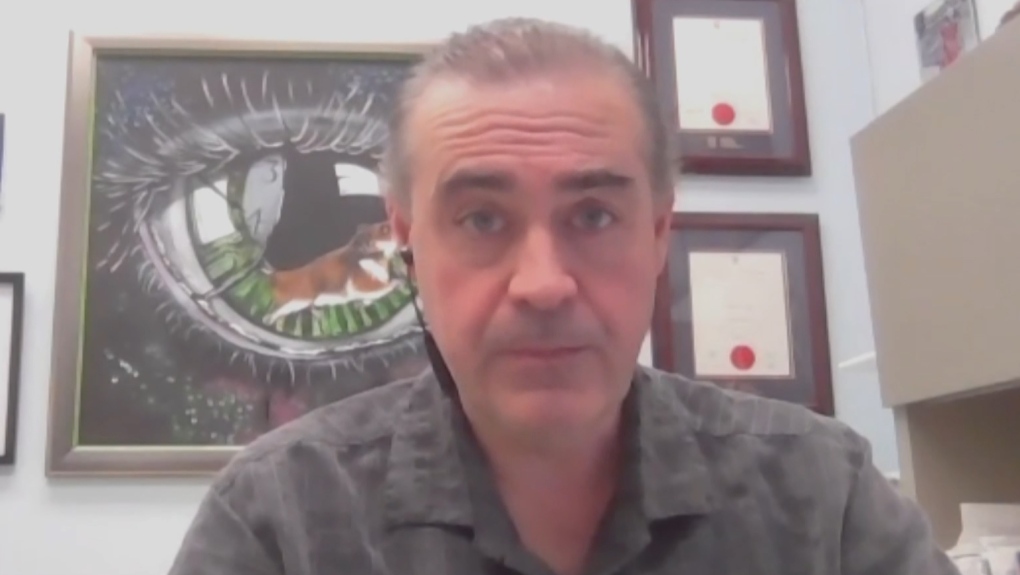'It's going to be harder for us': Expert warns Albertans against permanent daylight saving time
As Albertans began the process to elect their mayors, councillors and school trustees in advance polls this week, their premier found himself defending the two referendum questions the province included in this year's municipal vote.
Among the two questions, the Alberta electorate is being asked to choose whether to continue the ritual of rotating between standard and daylight saving time (DST), or to stick with DST all year.
But one circadian rhythm expert from the University of Calgary told CTV News Edmonton that question itself is flawed.
"We've been presented with two bad choices," Dr. Michael Antle said. "A bad one and a worse one."
Dr. Antle has been advocating for years to get rid of the bi-annual clock change, but says the province should be moving to get rid of DST and stick with standard time instead.
 "We know that (the time changes) do cause harm and it's absolutely killing me to be advocating for them right now, because I know how bad they are."
"We know that (the time changes) do cause harm and it's absolutely killing me to be advocating for them right now, because I know how bad they are."
According to Dr. Antle, a year-round DST would be worse for Albertans than the system they have now.
"Because of where Alberta is, relative to the time zones we follow, it's going to be harder for us," he said.
"Because we're so far north we have really short days, which means we're going to feel any adverse effects of being on the wrong time even more."
According to CTV News Edmonton Chief Meteorologist Josh Classen, a permanent DST would mean the sun wouldn't rise in Edmonton in December until around 9:40 a.m.
"And across the north (of Alberta) the sun doesn't come up until around 10 in the morning," said Classen.
Despite that fact, one Grande Prairie, Alta., city councillor worries many of his constituents don't understand the stakes of the permanent DST question.
"Just from my own personal conversations, I would say it's probably about 40 per cent of our people who understand the implications of this," Coun. Chris Thiessen told CTV News Edmonton.
Experts say the extra darkness in the morning can cause circadian disruption in our brains, a phenomenon commonly experienced by shift workers.
A 2017 study by the American Association for Cancer Research found circadian disruption, which is worse for people in the western part of a given time zone, was linked to increased rates of cancer.
Circadian misalignment can also lead to shorter sleeps, which multiple studies have linked to increased rates of diabetes, obesity and workplace injuries.
Still, on Tuesday, Alberta Premier Jason Kenney defended the referendum question, saying it would be the best way to stay in line with neighbouring jurisdictions.
B.C., Washington, Oregon and California are all moving toward a permanent DST, meaning a year-round standard time for Alberta would separate the time zones even further.
"I think it would be imprudent for Alberta to go in the opposite direction," Kenney said.
The province says a majority 'yes' vote on the permanent DST referendum question would mean the change would come into effect by next fall at the earliest.
With files from CTV News Edmonton's Dan Grummett
CTVNews.ca Top Stories

B.C. woman facing steep medical bills, uncertain future after Thailand crash
The family of a Victoria, B.C., woman who was seriously injured in an accident in Thailand is pleading for help as medical bills pile up.
LIVE @ 4 EDT Freeland to present 2024 federal budget, promising billions in new spending
Canadians will learn Tuesday the entirety of the federal Liberal government's new spending plans, and how they intend to pay for them, when Deputy Prime Minister and Finance Minister Chrystia Freeland tables the 2024 federal budget.
Annual inflation rate increased to 2.9% in March
The annual inflation rate ticked higher in March compared with February, boosted by higher prices for gasoline, Statistics Canada said Tuesday.
Inmate who escaped from N.B. prison has long history of violent crimes
An inmate who escaped from Dorchester Penitentiary in Dorchester, N.B., on Saturday evening has a long history of violent crimes and a history of escaping custody.
Tim Hortons launches pizza nationally to 'stretch the brand' to afternoon, night
Tim Hortons is launching flatbread pizzas nationally in a bid to pick up more afternoon and evening customers.
Thousands of dollars worth of tropical fish stolen from Ottawa Valley restaurant
Ontario Provincial Police are investigating the theft of "several thousand" dollars worth of tropical fish stolen from an Upper Ottawa Valley restaurant last week.
Ontario woman charged almost $7,000 for 20-minute taxi ride abroad
An Ontario woman was shocked to find she’d been charged nearly $7,000 after unknowingly using an unauthorized taxi company while on vacation in January.
NASA confirms mystery object that crashed through roof of Florida home came from space station
NASA confirmed Monday that a mystery object that crashed through the roof of a Florida home last month was a chunk of space junk from equipment discarded at the International Space Station.
Budget 2024 'likely to be the worst' in decades, former BoC governor says
Without having seen it, former Bank of Canada governor David Dodge believes that Tuesday's 2024 federal budget from Deputy Prime Minister and Finance Minister Chrystia Freeland is 'likely to be the worst budget' in decades.





























